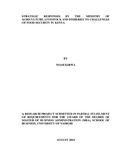| dc.description.abstract | Thompson and Strickland (1998) pointed out that an organization‟s strategy consists of
moves and approaches devised by management to produce successful organizational
performance. That strategy is a management‟s game plan for the business. Without a
strategy, there is no established course to follow, no roadmap to manage by, no cohesive
action plan to produce the intended results. This study observed the strategic responses by
the Ministry of Agriculture, Livestock and Fisheries to challenges of food security. The
objectives of the study were to determine challenges of food security in Kenya and
establish strategic responses adopted by the Ministry of Agriculture, Livestock and
Fisheries to address such challenges. This study was based on the fact that organizations
exist in ever changing environments that shape their opportunities and threats and in
order to cope with the changes, organizations must adjust accordingly such changes for
them to achieve their intended objectives. Both primary and secondary data was collected
in order to achieve the objectives of this study. Primary data was collected through
conducting personal interviews with the principal secretaries in The Ministry of
Agriculture, Livestock and Fisheries. Secondary data was obtained from the records
within the Ministry. A case study was used as the preferred research design for this study
in order to have an in-depth understanding of strategic responses by the ministry of
agriculture, livestock and fisheries to challenges of food security. This design was
appropriate since it provided solutions to the research problem through description of
challenges of food security and strategic responses adopted by the Ministry. The data
collected from the respondents was qualitative in nature and was analysed using content
analysis which enabled the researcher to reduce a large mass of data to simpler, more
understandable terms hence making it easier to understand the data that was used. The
study established that food security challenges in Kenya have adversely affected the
livelihoods of most households. These challenges include Climate change, Postharvest
losses, Inaccessibility to household productive resources, High prices of food items, Poor
distribution and marketing structures, High population growth rate and high cost of farm
inputs and Inadequate production and conflicts. According to the study, the ministry has
responded to these challenges through implementation of irrigation schemes to boost
production, construction of rural roads to ease transportation of food to markets, climate
change mitigation and awareness programmes, soil and water conservation projects and
construction of storage facilities such as grain stores. The ministry has managed to
address challenges of food security through such strategies but not adequately as food
insecurity is still a challenge. For this reason the researcher recommended that the
ministry should focus on prior planning and development of strategies to avoid reactive
actions that are applied when situations have already gone wrong. Long term strategic
planning should be put in place to avoid reactive responses like distribution of food aid to
already affected people. Early warning systems should be developed in order to avert
disasters. The ministry should focus more on research and development in order to be
efficient in responding pests and disease outbreaks. Extension services provision to
farmers should be intensified to enlighten farmers on modern farming technologies so as
to reduce over-reliance on rain-fed agriculture. However, limitations of the study
observed by the researcher were due to long time taken to book appointments with the
respondents due to their busy schedules and inadequate time offered by some of the
respondents for interview which led collection of shallow information. | en_US |

